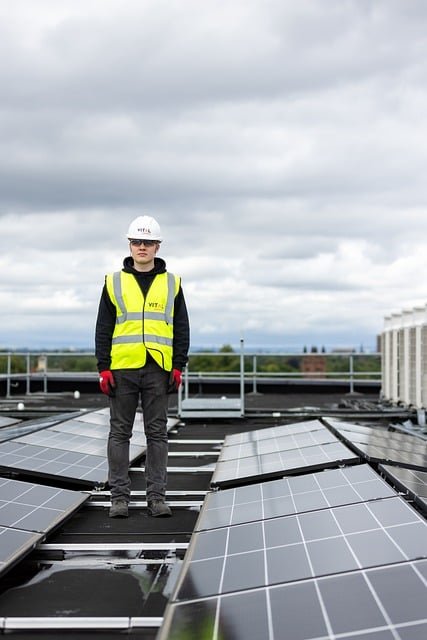Explore Careers in Solar Panel Installation ⚡
Interested in working in renewable energy? Learn what solar panel installation jobs involve, what skills are required, and how to start a career in this growing field. Explore training options, safety tips, and the everyday responsibilities of solar technicians.

The solar energy industry continues to experience remarkable growth as more homeowners, businesses, and utilities transition to renewable energy sources. This expansion has created a robust job market for solar panel installers and technicians. These professionals play a crucial role in the renewable energy transition by physically implementing the systems that capture solar energy. If you’re considering a career in this dynamic field, understanding the responsibilities, qualifications, and growth opportunities can help you make an informed decision about your professional path.
What Do Solar Panel Installers Actually Do?
Solar panel installers, also known as photovoltaic (PV) installers, are responsible for assembling, installing, and maintaining solar panel systems on rooftops, ground mounts, or other structures. Their daily responsibilities typically include:
- Conducting site assessments to determine optimal placement for maximum solar exposure
- Measuring, cutting, and assembling the structural framework that supports solar panels
- Safely installing panels, inverters, and electrical connections according to specifications
- Connecting systems to the electrical grid or battery storage solutions
- Performing system testing and troubleshooting to ensure optimal performance
- Completing necessary documentation and permitting paperwork
The role requires both physical stamina for rooftop work and technical knowledge of electrical systems. Most installers work within teams, collaborating with electricians, roofers, and project managers to complete installations efficiently and safely.
How to Become a Certified Solar Technician
Entering the solar installation field typically requires a combination of education, training, and certification. While some entry-level positions may be available to those with a high school diploma and willingness to learn, most employers prefer candidates with formal training or certification.
The most common pathway to becoming a certified solar technician includes:
- Completing a technical training program in solar installation, renewable energy, or electrical work through a community college or technical school
- Gaining hands-on experience through apprenticeships or entry-level positions
- Obtaining industry certifications such as the North American Board of Certified Energy Practitioners (NABCEP) PV Installation Professional certification
- Pursuing continuing education to stay current with evolving technology and installation methods
Many states also require solar installers to hold specific licenses, particularly for electrical work. These requirements vary by location, so researching local regulations is essential for anyone entering the field.
Skills Needed for Solar Installation Jobs
Success in solar installation requires a diverse skill set that combines technical knowledge, physical capabilities, and professional attributes. Key skills include:
Technical Skills: - Understanding of electrical systems and basic wiring principles - Ability to read and interpret technical diagrams and blueprints - Knowledge of mechanical and structural concepts for mounting systems - Familiarity with solar photovoltaic technology and components - Basic roofing knowledge and construction experience
Physical Abilities: - Comfort working at heights and in various weather conditions - Physical strength and stamina for lifting heavy panels and equipment - Manual dexterity for precise installation work - Balance and coordination for safe rooftop operations
Professional Skills: - Problem-solving abilities for troubleshooting installation challenges - Communication skills for explaining systems to customers - Attention to detail for ensuring safety and system performance - Time management for completing projects efficiently
Developing this combination of skills makes solar installers valuable team members and increases opportunities for advancement within the industry.
Training and Safety Guidelines for Solar Workers
Safety is paramount in the solar installation industry due to the combination of electrical work and elevated working conditions. Comprehensive training programs typically cover:
- Fall protection protocols and proper use of safety harnesses
- Electrical safety procedures and lockout/tagout practices
- Proper lifting techniques to prevent injuries
- Heat stress prevention and management
- Tool safety and equipment handling
- First aid and emergency response
Many employers provide ongoing safety training and require regular safety meetings. Organizations like the Occupational Safety and Health Administration (OSHA) offer specific training for construction and electrical safety that applies to solar installation work.
Beyond safety, training programs often cover technical aspects like system design, component selection, and performance monitoring. As technology evolves, continuing education becomes increasingly important for staying current with best practices and new products.
Solar Energy Jobs in the Renewable Industry
The solar energy sector offers diverse career paths beyond installation roles. As professionals gain experience and additional qualifications, they may advance to positions such as:
- Solar Project Manager: Overseeing complete installation projects from planning to completion
- System Designer: Creating custom solar solutions based on site conditions and client needs
- Sales Consultant: Helping customers understand solar options and benefits
- Site Assessor: Evaluating properties for solar potential and designing optimal systems
- Operations and Maintenance Technician: Specializing in ongoing system performance and repairs
- Instructor or Trainer: Teaching new technicians entering the field
The Bureau of Labor Statistics projects significant growth for solar installer positions in the coming decade, outpacing many other occupations. This growth is driven by decreasing costs of solar technology, government incentives, and increasing environmental awareness among consumers and businesses.
Salaries in the solar installation field vary based on location, experience, and specialization. Entry-level installers typically start with competitive wages that increase with experience and certification. Those who advance to specialized roles or management positions can command significantly higher compensation.
The solar industry also offers the intangible benefit of contributing to environmental sustainability and energy independence. For many professionals, this sense of purpose provides satisfaction beyond financial compensation.
As the renewable energy transition accelerates, solar installation professionals will continue to play a vital role in building the infrastructure for a more sustainable energy future. With the right training, certification, and commitment to safety, this career path offers stability, growth potential, and meaningful work for those interested in combining technical skills with environmental impact.



